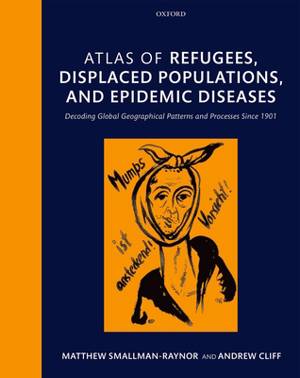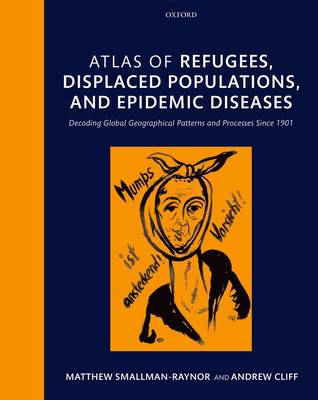
- Retrait gratuit dans votre magasin Club
- 7.000.000 titres dans notre catalogue
- Payer en toute sécurité
- Toujours un magasin près de chez vous
- Retrait gratuit dans votre magasin Club
- 7.000.000 titres dans notre catalogue
- Payer en toute sécurité
- Toujours un magasin près de chez vous
Atlas of refugees, displaced populations, and epidemic diseases
Decoding global geographical patterns and processes since 1901
Matthew Smallman-Raynor
Livre relié | Anglais
302,45 €
+ 604 points
Description
Refugees and displaced populations are a highly relevant, controversial topic of the modern socio-political landscape, with images of people fleeing conflicts and natural disasters a regular occurrence in the media. They flee to perceived safe havens, but are often accompanied by sickness, starvation, poor sanitation, close contact and reduced healthcare. Infection frequently spreads among camps, and sometimes, onwards into the local population. Epidemics develop. What are these diseases, and can they be controlled? What are the health consequences for the migrating and resident populations? What might the demographic impact be? The Atlas of refugees, displaced populations, and epidemic diseases examines the globally changing geographical patterns of communicable diseases among refugees and other displaced persons - in flight, in camps, and resettled in local communities - since the beginning of the twentieth century. The book explores historical and contemporary case studies, including the First World War and its aftermath, the impact of genocides across the twentieth and early twenty-first centuries, Mozambican refugees traversing Central Africa in the late 198's, the 21 Haiti earthquake, and the 214 Ebola virus crisis. The book integrates theory, qualitative and quantitative data, and spatial analysis, locating examples in the context of global demographics and summarising information in an approachable way. Illustrated with over 4 maps and diagrams, case studies are presented in regional and thematic contexts to guide the reader through the displaced populations and communicable diseases over the last 116 years. The discussion covers epidemiological determinants of outbreaks, including overviews of social and political factors that motivate displacement of populations. Important information on epidemic control and the results of these actions is also provided. The Atlas of refugees, displaced populations, and epidemic diseases is an essential resource for all those interested in public health, epidemiology, demography, ecology, economic history, and the history of medicine. This rich and detailed text is ideal for both specialists and students to deepen their understanding of the topic.
Spécifications
Parties prenantes
- Auteur(s) :
- Editeur:
Contenu
- Nombre de pages :
- 376
- Langue:
- Anglais
Caractéristiques
- EAN:
- 9780199676316
- Date de parution :
- 21-02-18
- Format:
- Livre relié
- Format numérique:
- Genaaid
- Dimensions :
- 224 mm x 277 mm
- Poids :
- 1292 g







